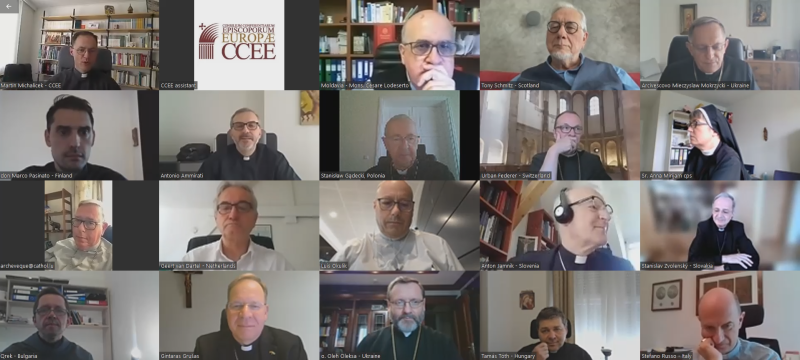Last Tuesday, 14 June, 28 Presidents and delegates of the European Bishops’ Conferences met online to receive updates on the situation regarding the war in Ukraine, and to reflect together on the role of the Catholic Church in Ukraine in the context of the current war.
The meeting was opened by H.E. Msgr. Gintaras Grušas, Archbishop of Vilnius and President of CCEE, who recalled the closeness of the bishops and ecclesial communities throughout Europe to the Ukrainian people. In particular, he recalled the day of the prayer of consecration of Russia and Ukraine to the Immaculate Heart of Mary made by Pope Francis, which was joined by the European bishops. He also recalled the Lenten initiative that saw the presidents of the national Bishops’ Conferences celebrate Mass, in turn each day of Lent, for the victims of the pandemic and for the dead of the war in Ukraine. The blood of Ukrainians cries out for justice and peace, added Msgr. Grušas, we must do all we can to stop this war as soon as possible. Let the world not forget this, let us not get used to war, let us work together for peace. The example of many families who have opened their homes to welcome the many Ukrainian refugees warms our hearts; it is a call for our Churches to be ever more welcoming and merciful and an invitation to pray for the conversion of peoples and nations.
Recounting the suffering of the Ukrainian people were the two presidents of the Ukrainian bishops. His Beatitude Sviatoslav Shevchuk, President of the Synod of Bishops of the Ukrainian Greek Catholic Church, thanked everyone present for their messages of solidarity, for their visits to Ukraine and for the aid sent: the Ukrainian people feel comforted by the closeness, attention and prayers of the Church at such a difficult time, and this helps to overcome the fear of being abandoned.
6 million Ukrainians have left the country to find refuge in neighbouring countries, while the churches in Ukraine have become centres of welcome, social service, shelter and protection from missiles for those who remain, without fail, thanks to the commitment of the priests to provide spiritual assistance.
H.E. Msgr. Mieczysław Mokrzycki, President of the Conference of Roman Catholic Bishops of Ukraine, joined in His Beatitude’s words of gratitude. ‘We bear the weight of the calamity that has befallen our homeland’, said the prelate, who then recalled how the current situation has lasted for several years, since 2014, and that in recent times it has acquired the appearance of destruction and death.
After expressing special thanks to Poland and Caritas Poland for the great humanitarian aid and for the reception of almost 3 million Ukrainian refugees, he recounted the great volunteer work being done in Lviv in welcoming those on their way to neighbouring countries and with the logistics centre to send aid to all the war zones, together with the work of spiritual support for those left behind and for those leaving for the front line.
There were several interventions by the participants at the meeting who, in addition to expressing the closeness of their respective ecclesial communities to the Ukrainian people, also recounted what is being done in their own nations to better welcome those fleeing the war and to foster the integration of women and children in particular. In each nation, for example, prayers for peace are said every day. In England, the choice has been made to welcome Ukrainians mainly into families. In Slovenia, a family of six lives in the house of the president of the Slovenian bishops together with him. Also in Slovenia, a record sum of 3 million EURO (the highest in the history of national collections) was collected for Ukraine. In Moldova, more than 1,200 families were taken in and work is being done to ensure care for women in labour and new-born babies: 812 Ukrainian babies were born during this period. In Scotland, work is being done to protect unaccompanied minors and, together with other organisations, offer accommodation to families and groups. In Switzerland, prayers are said for peace, also on an ecumenical level, and work is done on the accompaniment and spiritual care of refugees.
Fr Luis Okulik, Secretary of the CCEE Social Pastoral Commission, presented the CR4U (Catholic Response for Ukraine) initiative.
This working group, formed by representatives of Catholic-inspired organisations to coordinate actions on the ground and draw up a shared strategic plan, is engaged in five thematic areas:
- humanitarian aid [Caritas International, Caritas Europe, JRS, ICMC, Sovereign Order of Malta];
- advocacy [COMECE, ICMC, JRS, Caritas International, Caritas Europe];
- data collection [ICMC, JRS, Sovereign Order of Malta, Caritas International, Caritas Europe];
- religious assistance [CCEE, Bishops’ Conferences of Europe, Unions of Major Superiors];
- communications [Caritas International, ICMC, JRS, COMECE, CCEE, Caritas Europe].
The CCEE was entrusted with the coordination of pastoral care to ensure the presence of pastoral agents (priests, religious and laity) in cooperation with the Bishops’ Conferences of Europe.
At the end of the meeting, President Grušas, who will be visiting Ukraine from 15 to 20 July, thanked everyone for their participation and especially the Ukrainian bishops for the efforts they are making to help everyone.
Renewing the appeal of the European bishops to the Heads of Nations to commit themselves to stopping this war, he urged the Churches in Europe to continue to pray and work for peace, to be a concrete example of charity by opening their hearts and homes to welcome those fleeing war, rediscovering themselves as brothers and sisters.

